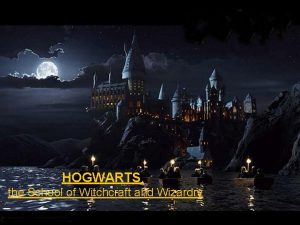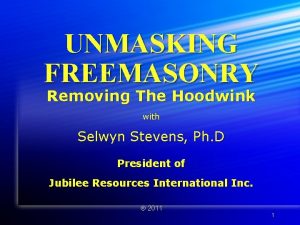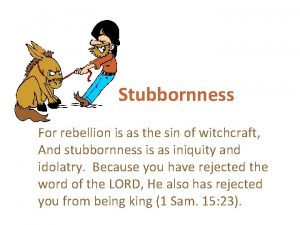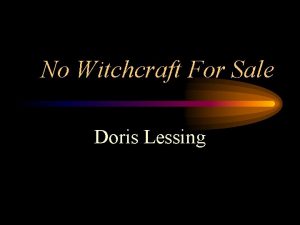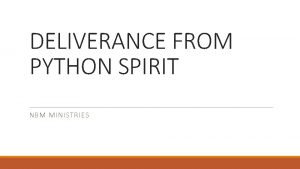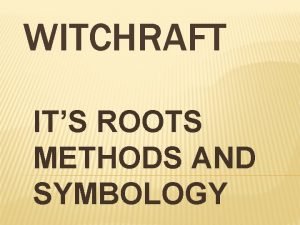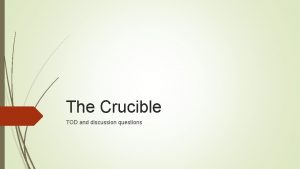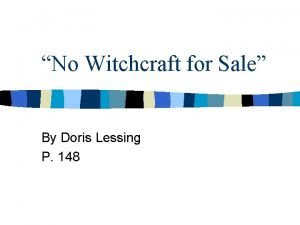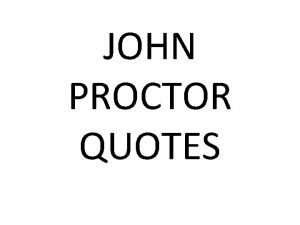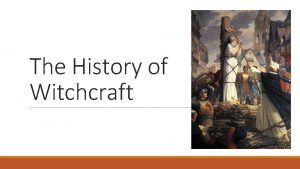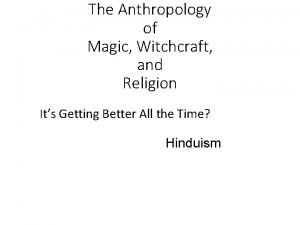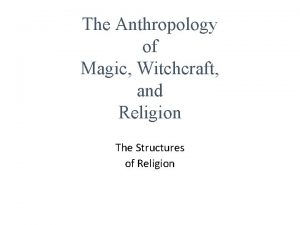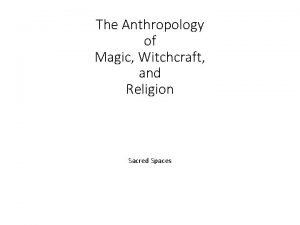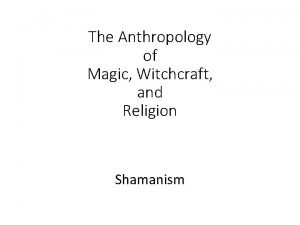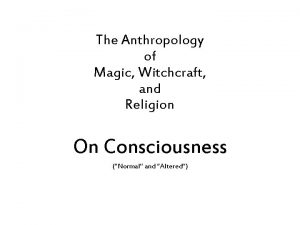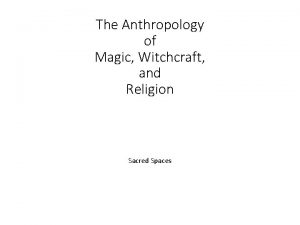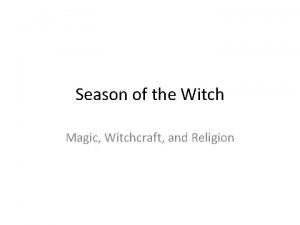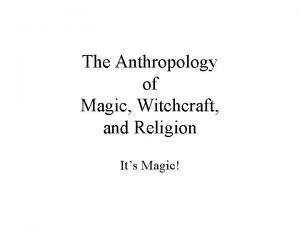MAGIC WITCHCRAFT RELIGION What are witchcraft magic and













- Slides: 13

MAGIC, WITCHCRAFT, & RELIGION

What are witchcraft, magic, and religion? l This page is for those who seek truth about the book series Harry Potter. Many think it is just harmless fantasy. True it is fantasy, but it is laced with witchcraft and demonology as are most books like it. Many say it gets children reading books who never would do so. I give you this tid-bit to ponder on. If your child did not like to take medicine and you had a chocolate drink with the medicine, plus arsenic in it, would you give it to them? You would if you did not know it was in there and what arsenic was. It is the same scenario with fantasy especially when it is laced with the poison of witchcraft. l http: //www. exposingsatanism. org/harrypotter. htm

Defining Our Terms & Asking Questions is a Place to Start! 1. 2. 3. 4. 5. What is the difference between religion and spirituality? What is the difference between Fundamentalisms and more commonly practiced versions of organized religions? What is magic? Who practices it? What is witchcraft? Who practices it? Is Harry Potter evil? Why or why not?

ANTHROPOLOGY OF RELIGION THEMES Difference Rationality Community Modernity Symbolism Meaning Relativism Mimesis Projection Mediation Order Hierarchy Conflict Alienation Love Well-being Dignity Aesthetics Creativity Playfulness Power Reproduction Fertility Maturation Death Tedium Excitement Motivation Suffering Redemption

CO-EXISTENCE OF SEEMINGLY OPPOSITE PROCESSES/ PHENOMENA: l Subjection and Freedom Worldliness and Asceticism l Morality and Desire l Imagination and Embodiment Inwardness and Outwardness Origins and Ends Order and Chaos Structure and Practice Cosmos and History l l l

4 ARGUMENTS IN ANTHROPOLOGY OF RELIGION 1. Religious worlds are real, vivid, and significant to those who construct and live in them. 2. It is important to describe & analyze those realities for others, grasping their sensory richness, philosophic depth, emotional range, and moral complexity.

ARGUMENTS IN ANTHROPOLOGY OF RELIGION 3. The power of “religious” worlds (their variety and competition). Such worlds affect how people act, ask questions, and think. 4. Religious practices are embedded in-- or complicit with--society, regimes of power, historical struggles, and modes of production.

19 TH CENTURY THINKING ABOUT RELIGION Edward Tylor, Primitive Culture, 1871 l American anthropologist l “The Belief in Spiritual Beings” l Rationalism and creativity of all humans l Evolutionary anthropology

19 TH CENTURY THINKING ABOUT RELIGION Emile Durkheim, The Elementary Forms of Religious Life, 1912 l French sociologist l Connection of the moral and religious l Religion is a natural expression of society, reflecting on its own transcendent power l Religion provides social cohesion, glue of mechanical solidarity l All religions can be understood as true once it is seen that they represent society: “Social Facts” l Seeing things “religious” in practical or secular western society l Structural-functionalist, does not address historical change

19 TH CENTURY THINKING ABOUT RELIGION Max Weber, The Protestant Ethic and the Spirit of Capitalism, 1904 l German sociologist l Role of religion in formation of “Secular modernity” l Protestantism and capitalism

SHIFTS IN THE 20 TH CENTURY l While 19 th c. thinkers saw members of small-scale societies mired in “superstition, ” “ignorance, ” “bliss” or “folly, ” anthropologists realized that this reproduced an evolutionary model of western intellectual superiority, SO… l Rather than compare nonwestern systems with western science, anthropologists sought to understand “religion” on a society’s terms (relativism).

SHIFTS IN THE 20 TH CENTURY l Compare western religious practices with nonwestern ones l MAJOR SHIFT—from explaining the irrational & exotic religious practices of Others to trying to understand the nature of religious practice anywhere.

l How is religion a part of everyday social life, social structures, and hierarchical relations of power? l How is religion—rather than “faith” or “meaning”—practice and power?
 Mikael ferm
Mikael ferm Gryffindor timetable
Gryffindor timetable Western religion vs eastern religion
Western religion vs eastern religion Masonic code of silence
Masonic code of silence Stubbornness is as the sin of witchcraft
Stubbornness is as the sin of witchcraft No witchcraft for sale sparknotes
No witchcraft for sale sparknotes Prayers against the python spirit
Prayers against the python spirit Elisha goodman midnight prayer bullets
Elisha goodman midnight prayer bullets What is parris position in salem
What is parris position in salem Witchcraft symbology
Witchcraft symbology American academy of witchcraft arts
American academy of witchcraft arts Crucible act 1 discussion questions
Crucible act 1 discussion questions No witchcraft for sale
No witchcraft for sale John proctor traits
John proctor traits

